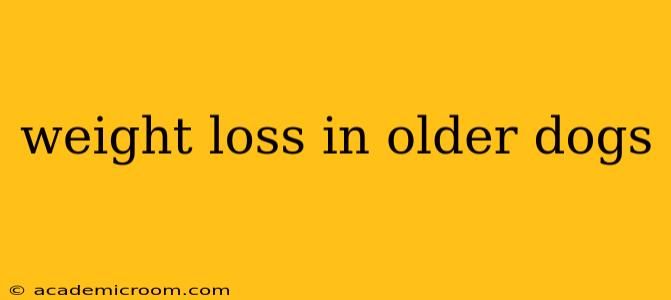Weight management is crucial for dogs of all ages, but it becomes even more important as they enter their senior years. Older dogs are prone to various health issues exacerbated by excess weight, such as arthritis, diabetes, and heart disease. This comprehensive guide explores the complexities of weight loss in older dogs, offering practical advice and addressing common concerns.
Why is Weight Loss Important for Senior Dogs?
As dogs age, their metabolism slows down, making it easier to gain weight and harder to lose it. Excess weight puts significant strain on their joints, already potentially weakened by age-related arthritis. This can lead to reduced mobility and increased pain, impacting their quality of life. Obesity also increases the risk of developing or worsening several serious health conditions, including:
- Arthritis: Extra weight puts immense pressure on joints, accelerating cartilage breakdown and inflammation.
- Diabetes: Obesity is a major risk factor for canine diabetes, making weight management crucial for diabetic dogs and those at risk.
- Heart Disease: Overweight dogs are more prone to cardiovascular issues due to increased strain on the heart.
- Certain Cancers: Some studies suggest a link between obesity and an increased risk of certain cancers in dogs.
- Reduced Lifespan: Maintaining a healthy weight can contribute to a longer, healthier life for your senior dog.
How to Help My Older Dog Lose Weight Safely?
Weight loss for senior dogs requires a careful and gradual approach, different from weight loss strategies for younger, more active dogs. Sudden or drastic weight loss can be harmful. Here’s a step-by-step guide:
1. Consult Your Veterinarian:
This is the most crucial step. Your vet can conduct a thorough examination, assess your dog's overall health, and rule out any underlying medical conditions contributing to weight gain. They can also help determine a safe and effective weight loss plan tailored to your dog's specific needs and age. They may recommend blood work to check for thyroid issues or other potential problems.
2. Adjust Food Intake:
Your vet will likely recommend a specific diet and portion size. Senior dog food is often formulated with lower calorie density and higher fiber content to help promote satiety and healthy digestion. Avoid free feeding; instead, measure food accurately at each meal.
3. Increase Physical Activity:
While strenuous exercise might be difficult for an older dog with joint problems, gentle exercise is still beneficial. Short, frequent walks are preferable to one long walk. Consider swimming, which is a low-impact exercise option. Always monitor your dog for signs of fatigue or pain.
4. Monitor Progress Regularly:
Weigh your dog regularly (weekly or bi-weekly) to track progress. Take photos to visually monitor changes. Adjust the diet and exercise plan as needed, based on your dog's response and your vet's recommendations. Sudden weight loss should be reported to your veterinarian immediately.
What are the Signs of Obesity in Older Dogs?
Recognizing obesity in senior dogs can be challenging, as age-related changes might mask the signs. However, some key indicators include:
- Difficulty Moving: Noticeable stiffness, reluctance to walk or play.
- Increased Panting: More panting than usual, even during rest.
- Loss of Muscle Mass: Visible thinning or loss of muscle tone.
- Increased Thirst and Urination: Potential signs of diabetes.
What are Some Safe and Effective Diets for Weight Loss in Older Dogs?
Many commercially available senior dog foods are designed to aid in weight management. Your vet can recommend specific brands or formulations based on your dog's breed, size, and health condition. Homemade diets should only be prepared under the guidance of your veterinarian or a veterinary nutritionist to ensure proper nutritional balance.
Can Supplements Help My Older Dog Lose Weight?
Some supplements may help support weight loss, but they should only be used under veterinary guidance. Never give your dog any supplements without consulting your vet first, as they can interact negatively with medications or underlying health issues.
How Long Does it Take for an Older Dog to Lose Weight?
Weight loss in older dogs is typically a slower process than in younger dogs. A safe and healthy weight loss rate is generally around 1-2% of their body weight per week. Patience and consistency are key.
By working closely with your veterinarian and following a well-structured plan, you can help your senior dog achieve a healthy weight, improving their quality of life and extending their lifespan. Remember, gradual and consistent changes are essential for successful and safe weight loss in older dogs.
